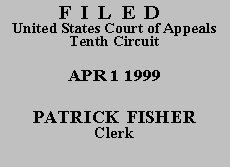

| VIVIAN S. SMITH,
Plaintiff-Appellant, v. KENNETH S. APFEL, Commissioner, Social Security Administration, Defendant-Appellee. |
|
Claimant Vivian S. Smith applied for Social Security disability insurance benefits alleging disability since 1988 because of pain in her back, shoulder and hip, poor vision due to glaucoma, and sleepiness, nausea and dizziness resulting from post-mastectomy medication. The administrative law judge (ALJ) determined at step five of the sequential evaluation process that claimant was not disabled. The district court affirmed the Commissioner's decision, and claimant appeals. Applying the same standard of review as the district court, we review the Commissioner's decision to determine whether his factual findings are supported by substantial evidence and whether he applied the correct legal standards. See Nguyen v. Shalala, 43 F.3d 1400, 1402 (10th Cir. 1994).
The ALJ determined that claimant was impaired by right arm pain and that she was limited to sedentary work. See Appellant's App. at 20. The ALJ further found that this impairment and claimant's residual functional capacity prevented her from performing her past relevant work as a doctor's receptionist which was characterized by the vocational expert as light work. Because claimant was fifty-four years old when her insured status expired (closely approaching advanced age), had no education which would provide her direct entry into skilled work, and was limited to sedentary work, she would be presumptively disabled under the Medical-Vocational Guidelines if she did not have any skills which would be transferable to another job. See 20 C.F.R. Pt. 404, Subpt. P, App. 2, § 201.14. If she had transferable skills, she would not be presumptively disabled. See id. § 201.15.
The ALJ found that claimant has transferrable clerical and filing skills which would enable her to work as an order clerk. The vocational expert, however, testified that the majority of order clerk jobs require computer skills, see Appellant's App. at 58-59. There was no evidence regarding the number of order clerk jobs not requiring computer skills that exist either in the regional or national economy, although the vocational expert testified that those jobs would be at a minimum, see Appellant's App. at 58-59, and later testified that "everything involves computers as far as clerical anymore. If you don't have computer skills you really are out of the job market," id. at 60.(1)
Claimant testified that in her receptionist job she worked with a computer for one hour per day for one week. See Appellant's App. at 49. Thus, claimant had acquired five hours of computer experience sometime between 1981 and 1988.
The Social Security regulations define a skill as
knowledge of a work activity which requires the exercise of significant judgment that goes beyond the carrying out of simple job duties and is acquired through performance of an occupation which is above the unskilled level (requires more than 30 days to learn). It is practical and familiar knowledge of the principles and processes of an art, science or trade, combined with the ability to apply them in practice in a proper and approved manner.
Soc. Sec. R. 82-41, 1982 WL 31389 at *2. Applying this definition, it is clear that five hours of experience on a computer could not result in claimant having acquired computer "skills." The ALJ's conclusion that claimant had transferable skills which would enable her to work as an order clerk is thus unsupported by substantial evidence.
"'In reversing the [Commissioner's] determination, it is within our discretion to remand to the [Commissioner] for a further hearing or direct the district court to award benefits.'" Emory v. Sullivan, 936 F.2d 1092, 1095 (10th Cir. 1991) (quoting Dixon v. Heckler, 811 F.2d 506, 511 (10th Cir. 1987)). The Commissioner has not articulated any reason why the presumption of disability established by the Medical-Vocational Guidelines should not determine the outcome of this case. Claimant applied for benefits on May 19, 1994, nearly five years ago, and is now fifty-nine years old, or "a person of advanced age" under the regulations. See 20 C.F.R. § 404.1563(d). A remand at this juncture for a hearing is unnecessary and would be judicially inefficient. See Nielson v. Sullivan, 992 F.2d 1118, 1122 (10th Cir. 1993) (refusing to remand for a hearing where ALJ failed to make required findings targeted at the level of vocational adjustment needed for fifty-nine-year-old claimant, claimant had made prima facie case of entitlement, and record was fully developed). Accordingly, we direct the district court to award benefits.(2)
The judgment of the United States District Court for the Northern District of Oklahoma is REVERSED and REMANDED.
Entered for the Court
Circuit Judge
*. This order and judgment is not binding precedent, except under the doctrines of law of the case, res judicata, and collateral estoppel. The court generally disfavors the citation of orders and judgments; nevertheless, an order and judgment may be cited under the terms and conditions of 10th Cir. R. 36.3.
1. We also note that, because claimant was "closely approaching advanced age," agency regulations require consideration of whether her age "may seriously affect [her] ability to adjust to a significant number of jobs in the national economy." 20 C.F.R. § 404.1563(c). The vocational expert testified that claimant would have to make a "considerable adjustment" to any job requiring computer use. See Appellant's App. at 58-59.
2. Because of our disposition of this appeal, it is unnecessary for us to reach claimant's contention that the Commissioner did not adequately consider her nonexertional impairments.